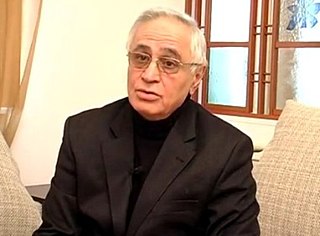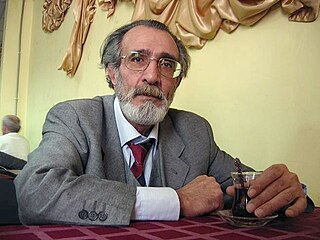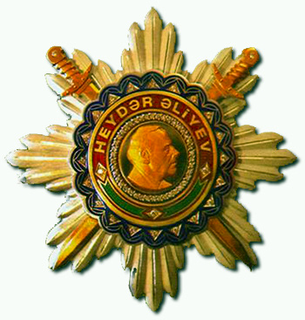
Robert Sedraki Kocharyan is an Armenian politician who served as the second President of Armenia between 1998 and 2008. He was previously President of Nagorno-Karabakh from 1994 to 1997 and Prime Minister of Armenia from 1997 to 1998.

Heydar Alirza oglu Aliyev was an Azerbaijani politician who served as the third President of Azerbaijan from October 1993 to October 2003. As national president he held constitutional powers, but his influence on Azerbaijani politics had begun years earlier. As a young man he had joined the Azerbaijan SSR People's Commissariat for State Security (NKGB) and quickly rose to the rank of Major-General.
Articles related to the Azerbaijan Republic include:

Rahim Hasan oglu Gaziyev was Azerbaijani Defense Minister in 1992–1993, in the turmoil of the Nagorno-Karabakh War, and later a political prisoner.
Boris Sarkisovich Kevorkov (1932–1998) was the Secretary of the Nagorno-Karabakh Autonomous Oblast from 1973 until his dismissal in February 1988.

Azerbaijan–Kazakhstan relations refer to foreign relations between Azerbaijan and Kazakhstan. Azerbaijan has an embassy in Nur-Sultan and a consulate in Aktau. Kazakhstan has an embassy in Baku.

The Bishkek Protocol is a provisional ceasefire agreement, signed by the representatives of Armenia, the unrecognized Nagorno-Karabakh Republic, Azerbaijan and Russia's representative to the OSCE Minsk Group Vladimir Kazimirov on May 5, 1994 in Bishkek, the capital of Kyrgyzstan.

Alikram Hummatov or Ali Akram Hemmatzadeh is a Talysh military and political activist of Azerbaijan, the president of self-proclaimed Talysh-Mughan Autonomous Republic in 1993, formerly prisoned in Azerbaijan. He was considered as a political prisoner by international organizations including Amnesty International and Council of Europe. After demands from the Council of Europe, Hummatov was granted retrials, yet according to Human Rights Watch report, the authorities conducted him inside prisons, and with procedural violations.
Miatsum is a concept and a slogan used during the Karabakh movement in the late 1980s and early 1990s, which led to the Nagorno-Karabakh War in 1992–1994.
Tahir Aliyev Yunis oglu was the Minister of Defense of Azerbaijan, Minister of Internal Affairs of Azerbaijan Republic and Chairman of State Customs Committee.
The Capture of Garadaghly or Garadaghly Massacre occurred when Armenian troops captured Garadaghly, a village in Khojavend district of Azerbaijan, on 17 February 1992 during the Nagorno-Karabakh War. More than 20 civilians were killed and many taken prisoner.

Major General Nuraddin Sadigov Sadig oglu also known as Nuraddin Sadikhov, was the Chief of General Staff of Azerbaijani Armed Forces, Deputy Minister of Defense of Azerbaijan Republic and National Advisor on Military Issues.

Heydar Aliyev Order - supreme order of Azerbaijani Republic. The order was ratified by legislation of Azerbaijan Republic by the Decree No. 896-IIQ on April 22, 2005. The Heydar Aliyev Order is given to the citizens of the Republic of Azerbaijan for special contributions to the prosperity, greatness and glory of Azerbaijan; for courage and bravery displayed in defense of the Motherland and state interests of the Azerbaijan Republic. The Order is given to the President of Azerbaijan according to status.

Clashes on the Armenian–Azerbaijan border (Tavush–Qazakh) and the line of contact between the Nagorno-Karabakh and Azerbaijan started on 27 July 2014. Reported casualties of the clashes were some of the highest since the 1994 ceasefire agreement that ended the Nagorno-Karabakh War.
The following lists events that happened during 2014 in the Republic of Azerbaijan.

Mais Shukur oghlu Barkhudarov is an Azerbaijani officer, general-major of Armed Forces of Azerbaijan, who was a participant of 2016 Nagorno-Karabakh clashes.
The Congress of World Azerbaijanis reconvenes every five years and represents Azerbaijanis living in foreign countries.
Yunis Aliyev was the military serviceman of Azerbaijan Armed Forces, Chief Colonel and warrior during the Nagorno-Karabakh conflict.

Shargiyya Veliyeva, is an Azerbaijani farmer and politician, former member of the Supreme Soviet of Azerbaijani SSR.
The Azerbaijan's State Commission for Prisoners of War, Hostages and Missing Persons has been established in order to release hostages and prisoners of war as a result of Karabakh conflict. It increases the effectiveness of search for captured and missing persons in conflict zones, and coordinates the activities of public bodies and international organizations for attracting attention to this issue.










